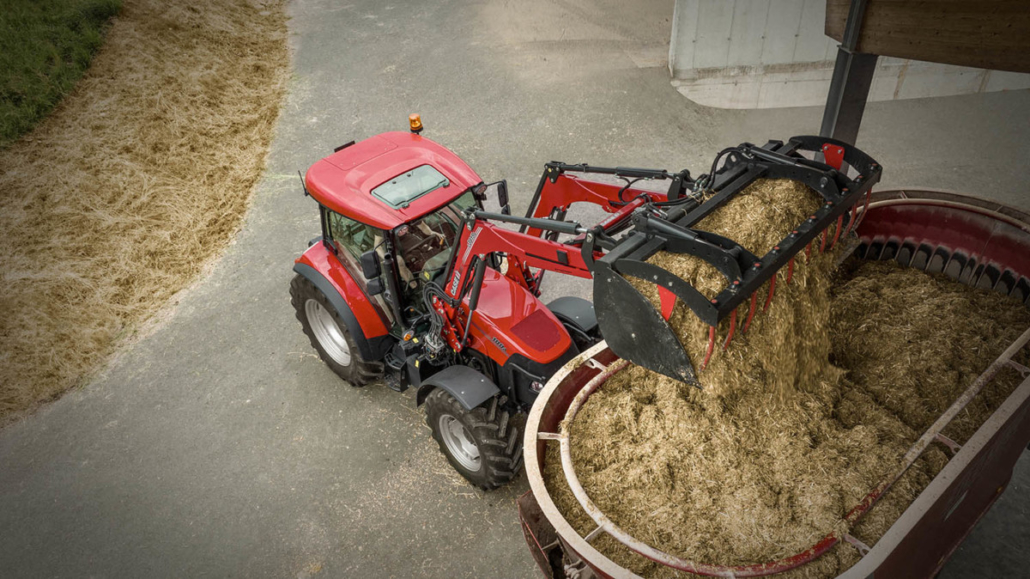Case IH launch new Farmall A models: Case IH has launched two new Farmall A tractors, the 90hp 90 A and 100hp 100 A, which form part of the company’s extended Farmall range from 55hp to 120hp
Designed for small and medium mixed farms, together with specialist livestock enterprises and smallholdings, these robust, versatile all-round tractors are highly productive, comfortable, and manoeuvrable. Providing excellent value for money, they are ideal for applications such as hay and forage, livestock, seeding, spraying, fertilising, light tillage, and transport.

Case IH launch new Farmall A models
Powerful and efficient
With common rail fuel injection and 4-valves per cylinder design, the new four-cylinder, 3.6-litre FPT F5 engine is very responsive. This engine is able to provide outstanding maximum torque at lower engine speed, 380Nm and 450Nm at 1300rpm in the Farmall 90 A and Farmall 100 A respectively. The excellent 47% torque rise delivers strong lugging ability in high load situations.
Despite its considerable responsiveness, the FPT F5 is highly fuel efficient, which combined with the larger 130l fuel and 14.4l AdBlue tanks means more time can be spent working before refuelling. Another significant benefit is the 600-hour service intervals, which minimise downtime and maintenance costs.
A key feature of the engine is its highly efficient and maintenance-free After Treatment System (ATS). Developed to meet Stage V legislation, the Compact Hi-eSCR2 emissions reduction technology requires no filter replacement or mechanical cleaning. Highly effective, it integrates a Diesel Oxidation Catalyst (DOC), a Diesel Particulate Filter (DPF) and a Selective Catalyst Reduction (SCR) system, which is very compact due to an Exhaust Gas Recirculation (EGR) rate of less than 10%.
This advanced technology is contained under the engine hood, allowing simple, fast loader installation, together with easy access to oil and engine filters located on the left side of the tractor. With no external components, the design also maximises ground clearance, which contributes to operator safety during row crop and hay-making operations, provides excellent forward visibility and makes the tractor very easy to manoeuvre precisely.
Power is transmitted through a simple, efficient, dependable, and durable 12 x 12 40kph mechanical transmission or optional hydraulically actuated Powershuttle, the four gears in each of the three ranges enabling exactly the right speed to be selected for each task. A 20 x 20 creeper transmission option is also available.
Four-wheel drive Farmall 90 A and 100 A models feature a Class 1.0 front heavy-duty axle with electro-hydraulic differential lock, while adjustment-free annular disc brakes deliver powerful braking performance. Automatic engagement of the four-wheel drive system under braking is also available to improve performance, stability, and safety further.
Extended versatility
To extend the versatility of these new Farmall A models, the rear linkage has a maximum lift capacity of 4,400kg, while the Case IH Lift-O-Matic™ system offers fast raising and lowering of implements to a pre-set position on headlands. The tractors also feature a smooth, self-modulating electro-hydraulic independent three-speed PTO (540/540E/1000) with ECO and ground speed options.
Options includes a mechanical front linkage which can lift up to 1,400kg, a front 1,000rpm PTO and an Extra Flow open-centre pump with a very high hydraulic flow rate of 82 l/m. This improves loader cycle times further and will be beneficial when operating linkage-mounted implements through up to three remote outlets.
Both new Farmall A models can also be specified from the factory with loader-ready brackets and hydraulics, making them compatible with the Case IH front loader offering. The ideal loader for the new Farmall A is the Case IH L3815A. Utilising a simple plug and play design, it has a lift height of up to 3.8m and a maximum capacity of 1,922kg, ideal for general handling tasks.
Operators will enjoy the new 4-pillar, flat-floor cab, with up to four external working lights and easy access up wide steps to the large single door. Inside there is more space, air conditioning is standard, and the maximum sound level is just 77db. The optional roof hatch has been made wider to improve overhead visibility, while a 320° angle of vision provides outstanding all-round vision, perfect when working in confined areas. All controls are positioned in a panel to the operator’s right side and are within easy reach, the air suspended seat optimises ride comfort, while a USB socket and ‘phone holder provide added convenience.
Edoardo Ronco, Case IH Product Manager responsible for the Farmall A range, states: “The new Farmall 90 A and Farmall 100 A are significant new introductions for Case IH in this important sector of the market. Both incorporate significant benefits which make them more productive, more cost effective and more comfortable to operate.”
For the latest industry news visit turfmatters.co.uk/news
Get all of the big headlines, pictures, opinions and videos on stories that matter to you.
Follow us on Twitter and Instagram for fun, fresh and engaging content.
You can also find us on Facebook for more of your must-see news, features, videos and pictures from Turf Matters.


















